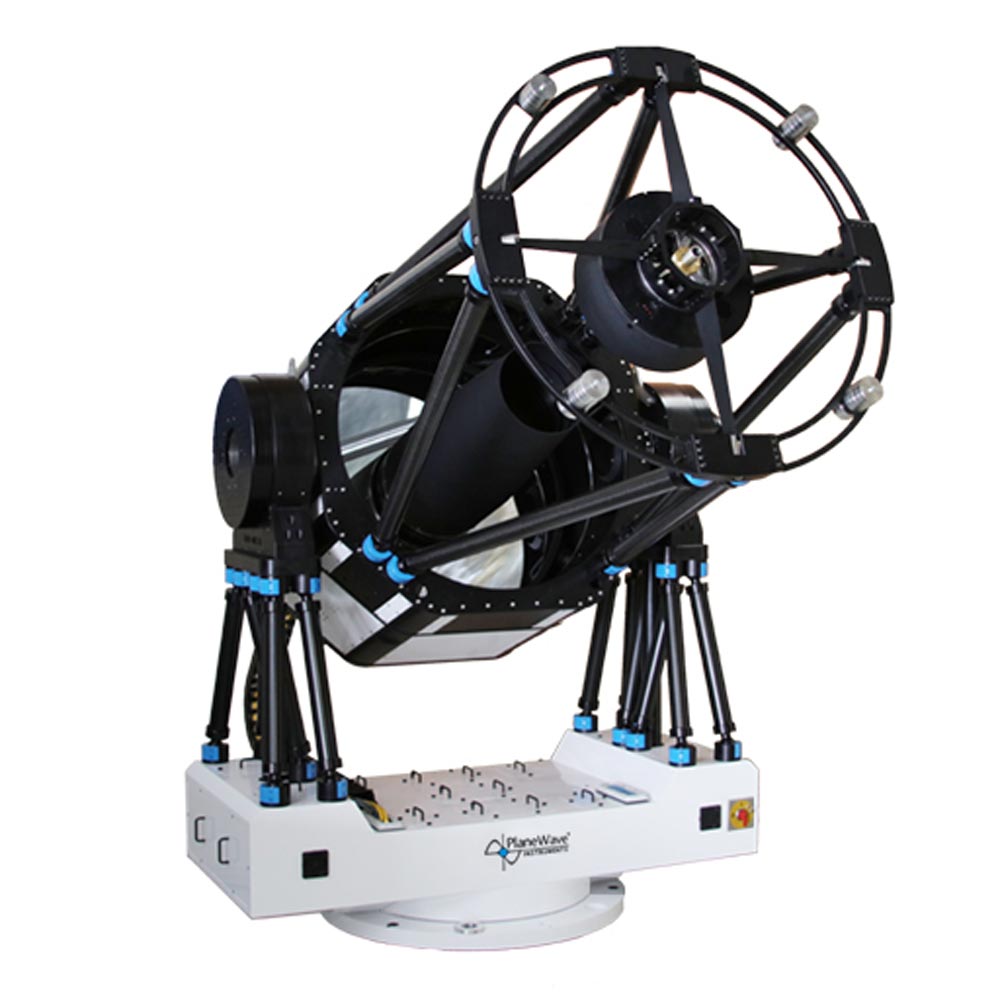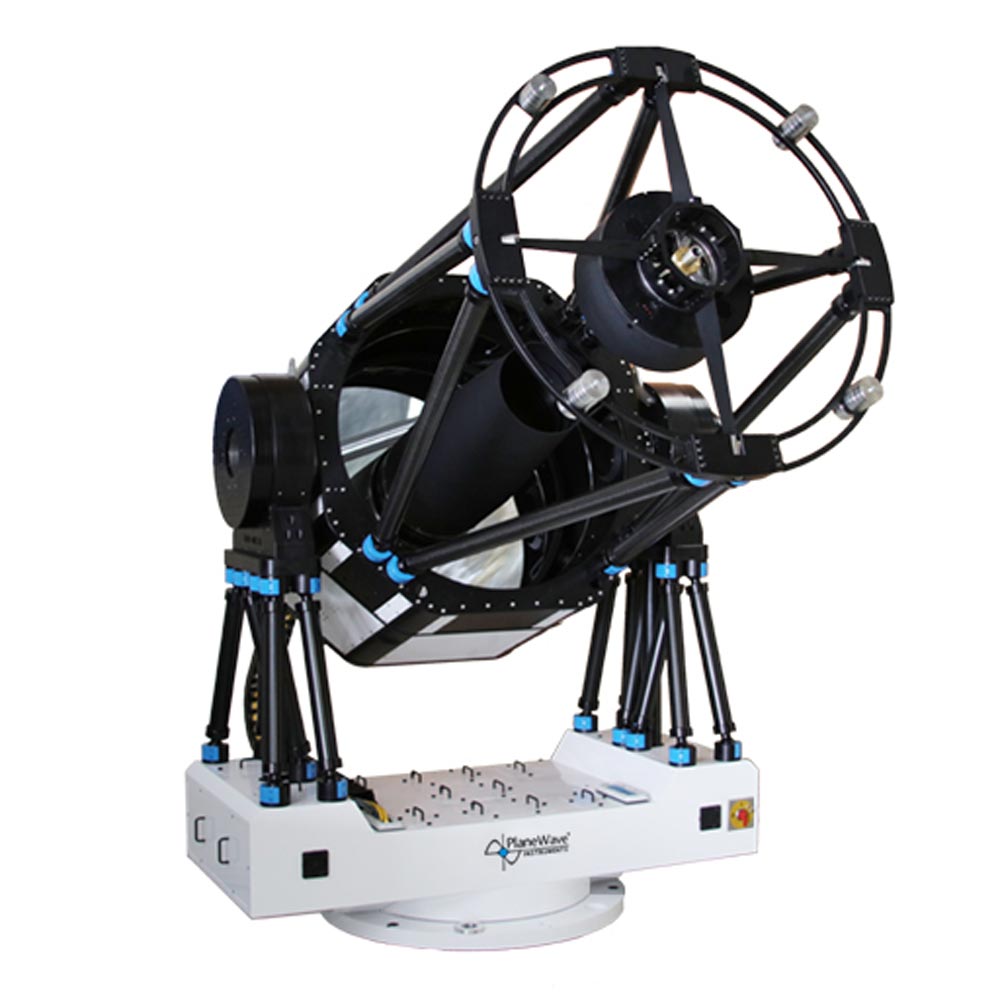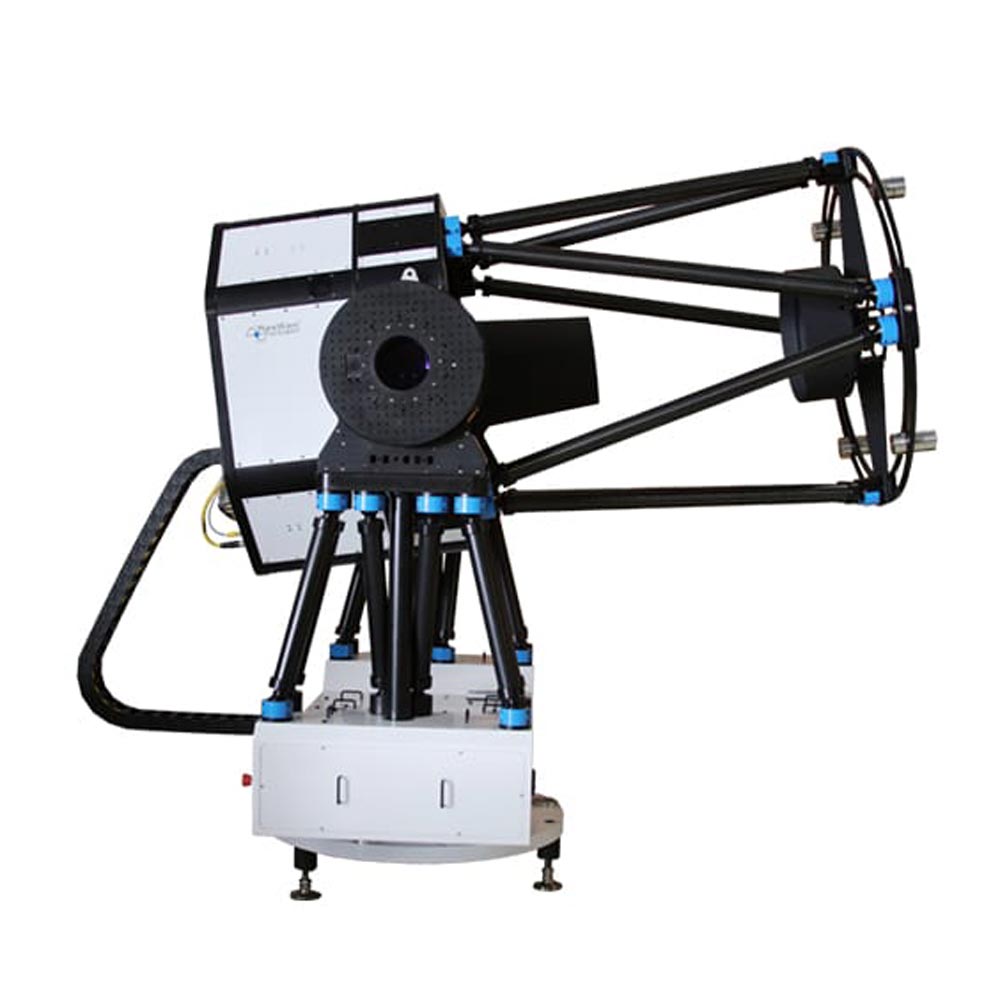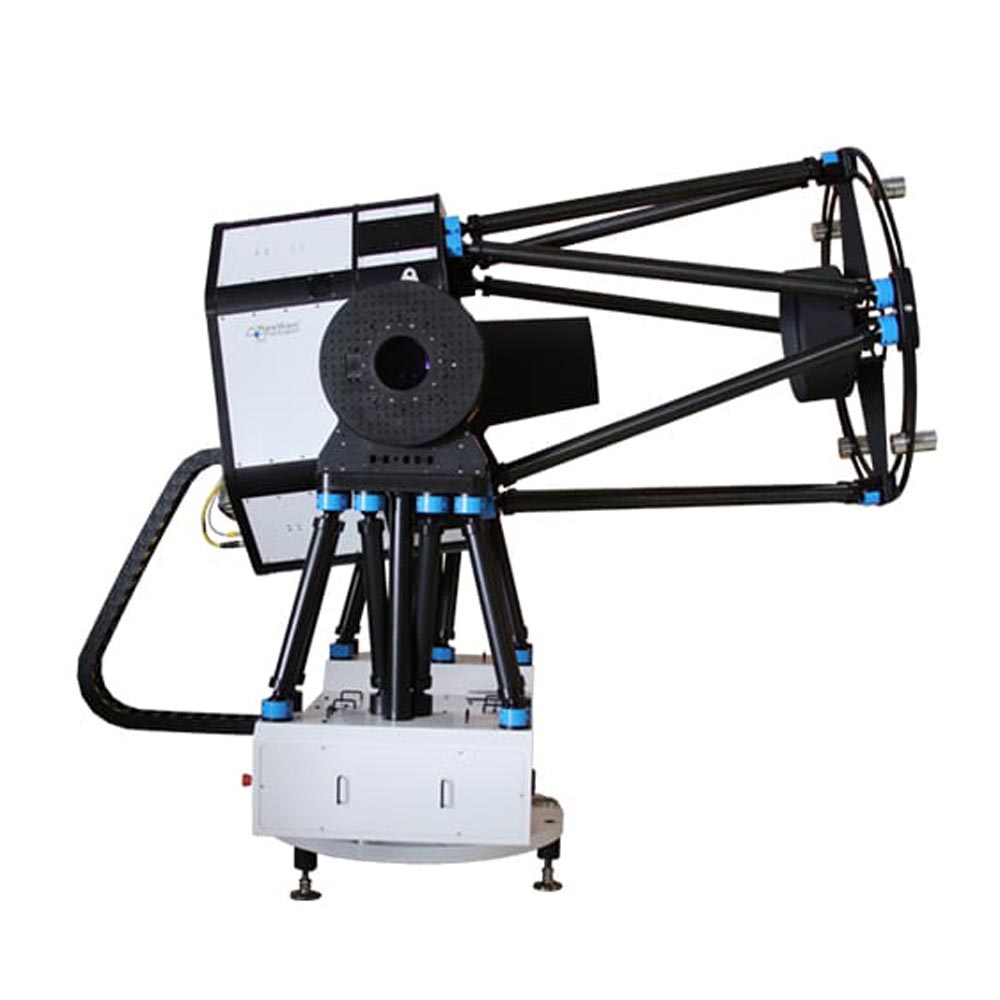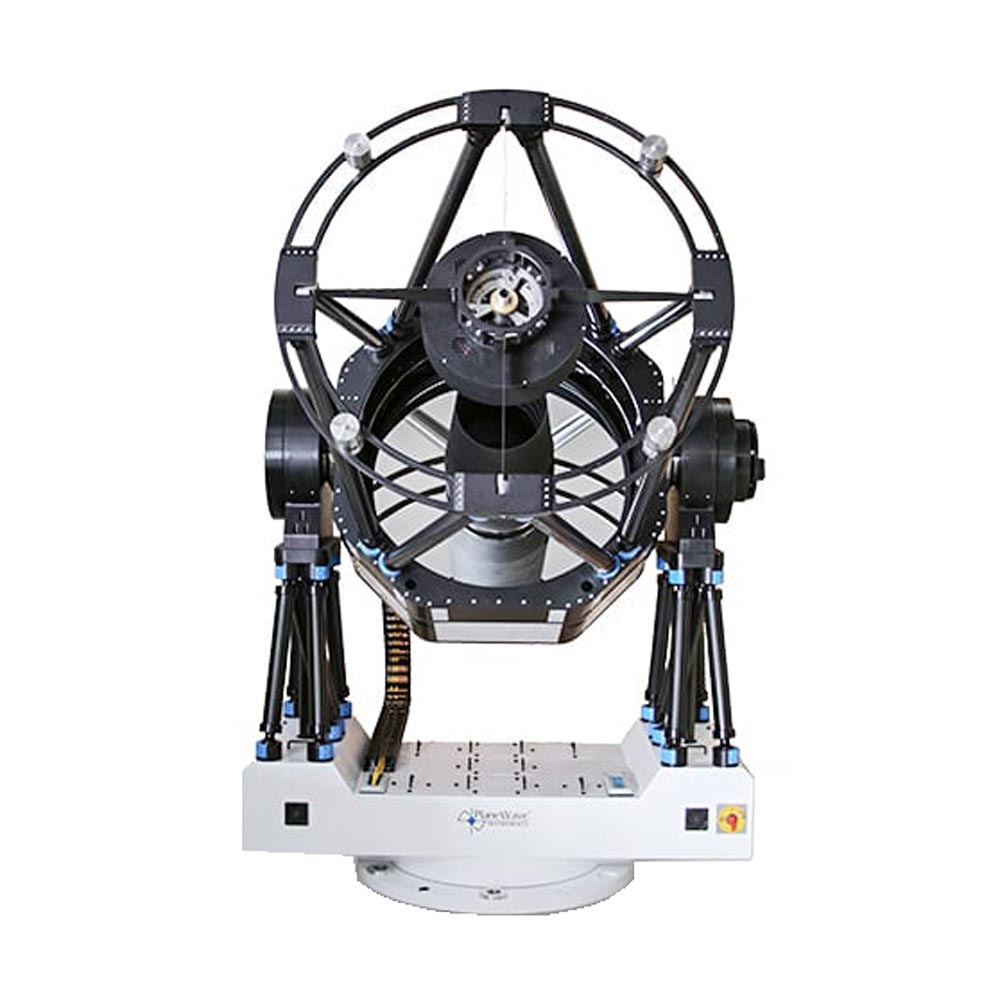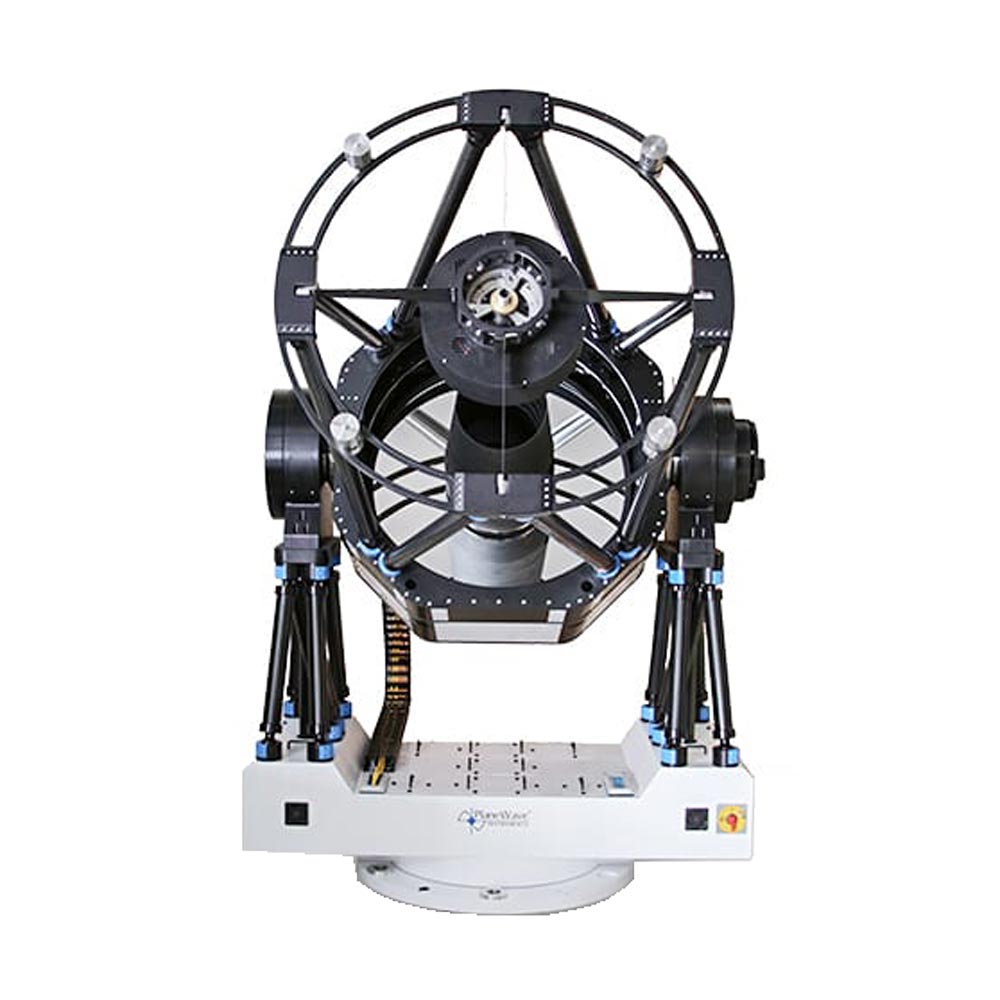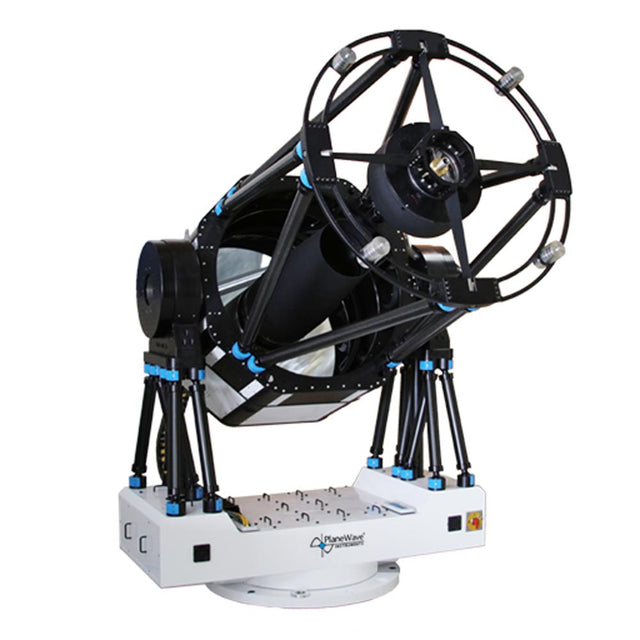PLANEWAVE PW1000 OBSERVATORY SYSTEM
PlaneWave
Alt-Azimuth
Corrected Dall-Kirkham
1180 kg
PLANEWAVE PW1000 OBSERVATORY SYSTEM is backordered and will ship as soon as it is back in stock.
Prices do not include shipping costs. Contact us for exact shipping prices before purchasing.
The PW1000 is a complete 1-meter observatory-class telescope featuring a direct drive altitude-azimuth (Alt-Az) mounting system designed and engineered by PlaneWave. With a diffraction-limited 100mm image circle, the PW1000 is designed to excel at imaging on the largest format CCD cameras available today.
Light-weighted optics are made of zero expansion fused silica materials for excellent thermal stability and maximum throughput. The dual Nasmyth ports allow two instruments to be installed simultaneously, and a computer-controlled M3 mirror allows either instrument to be remotely selected in seconds. With direct-drive motors, high-resolution encoders, zero-backlash and no periodic error, the PW1000 sets a new standard in 1-meter class observatory telescopes.
PW1000 Features
- Pinpoint stars out to a 100mm image circle
- Ultra-low thermal expansion fused silica optics
- Dual Nasmyth focus, allowing simultaneous mounting of two instruments or easy switching between visual and imaging use
- Direct-drive motors on each axis for smooth, fast, and virtually silent movement of the telescope
- High resolution encoders on each axis for precise positioning
- Zero backlash
- Zero periodic error
- PointXP mount modelling software
- Field de-rotator / rotational field framing
An alt/az mount is inherently more stable than an equatorial mount since there is no cantilevered mass, nor are there any large protruding counterweights to create a dangerous hazard in a public observatory. An alt/az telescope is also considerably more compact than its equatorial counterpart, allowing a larger telescope to fit in a smaller enclosure. The mass it takes to make a rigid alt/az mount is substantially less, leading to cost savings.
Benefits of Nasmyth focus
The Nasmyth Focus is along the altitude axis so there are virtually no balancing issue as you change out equipment. Eyepieces remain at a constant wheelchair-accessible height, greatly simplifying access to the telescope for public observatories. The rotating tertiary mirror allows you to switch from one Nasmyth port to the other in just seconds, allowing observers to easily transition between imaging and visual use.
Rotating tertiary mirror
The PW1000 includes an integrated rotator for the tertiary mirror, with magnetic locks to position the mirror precisely for either Nasmyth focus position. The rotator can move from one port to the other in under 10 seconds.
Direct drive motors and encoders
Direct Drive motors mean that there are no gears to cause backlash and periodic error. With high-resolution encoders providing the feedback for the direct drive motors, not only will the telescope track without periodic error or have any backlash at all, but the mount will be able to counter against wind gusts. The direct drive motors can move the telescope at incredible speeds for tracking satellites or just to minimize target acquisition time.
Automated primary mirror shutter
Protects the primary mirror from unwanted dust and moisture with integrated four shutter automated system, fully controllable with PlaneWave’s PWI software.
Optics
Optical system
| Aperture | 1000 mm (39.37") |
|---|---|
| Focal length |
6000 mm |
| Focal ratio |
f/6 |
| Central obstruction |
47% of the primary mirror diameter |
| Backfocus from mounting surface |
370 mm |
| Optical performance (400-900 nm) |
3.7μ RMS at 35 mm on-axis; 5.0μ RMS at 50 mm off-axis |
| Image scale |
29μ per arcsecond at f/6 |
| Optimal field of view | 100 mm image circle (1.0 degrees) |
| Construction |
Dual truss structure with Nasmyth focus |
| Weight | 1180 kg |
| Dimensions | 135″ H x 72″ W x 45″ D |
Primary mirror
| Optical diameter |
1000 mm |
|---|---|
| Outer diameter | 1020 mm |
| Material |
Fused silica (quartz) |
| Core diameter |
360.7 mm |
| Edge thickness |
85 mm |
| Weight |
55.4 kg |
| Radius of curvature | 6260 mm |
Secondary mirror
| Optical diameter |
450 mm |
|---|---|
| Material |
Fused silica (quartz) |
| Weight |
12.34 kg |
| Radius of curvature | 2961 mm |
Tertiary mirror
| Optical major diameter |
404 mm |
|---|---|
| Optical minor diameter |
286 mm |
| Material |
Fused silica (quartz) |
| M3 thickness | 65 mm |
Mechanics
Mechanical structure
| Fork assembly |
Space frame steel truss |
|---|---|
| Fork base | Welded stainless steel torsion box |
| Azimuth bearing |
Dual 11.125 inch tapered roller bearings |
| Altitude bearing |
Three 9.5 inch 4 way loaded ball bearings (two pre-loaded on motor side, one on non motor side) |
| Optical tube |
Dual truss structure with Nasmyth focus |
| Instrument payload | 136 kg (68 kg mounted on the field de-rotator plate) |
Motion control
| Motor control |
Industrial grade Parker brushless motor control system and built in electronics |
|---|---|
| Motors |
Direct Drive 3 Phase Axial-Flux Torque Motors |
| Encoders |
Absolute encoder with a resolution of 0.005 arcseconds (268 million counts per revolution) |
| Motor torque |
Greater than 200 ft-lbs of peak torque |
| Drive electronics |
Controls the altitude and azimuth motors and encoders, 2 direct drive de-rotators with absolute encoders, 4 fans zones, 3 dew heater zones, two focusers, an array of temperature sensors, M3 port selector, primary mirror covers and magnetic axis deceleration |
| Control software | Incorporates PointXP mount modelling software by Dave Rowe All ASCOM compatible. |
System performance
| Pointing accuracy | Better than 10 arcsecond RMS with PointXP Model |
|---|---|
| Pointing precision |
2 arcsecond at sidereal velocity |
| Tracking accuracy |
<1 arcsecond error over 10 minute period at sidereal velocity |
| System natural frequency |
10 Hz or greater |
| Field de-rotator accuracy |
3 microns of peak to peak error at 35mm off-axis over 1 hour of tracking (18 arcsec) |
-
Mount type
-
Optical design
-
Aperture
-
Focal length
-
Focal ratio
-
Weight

